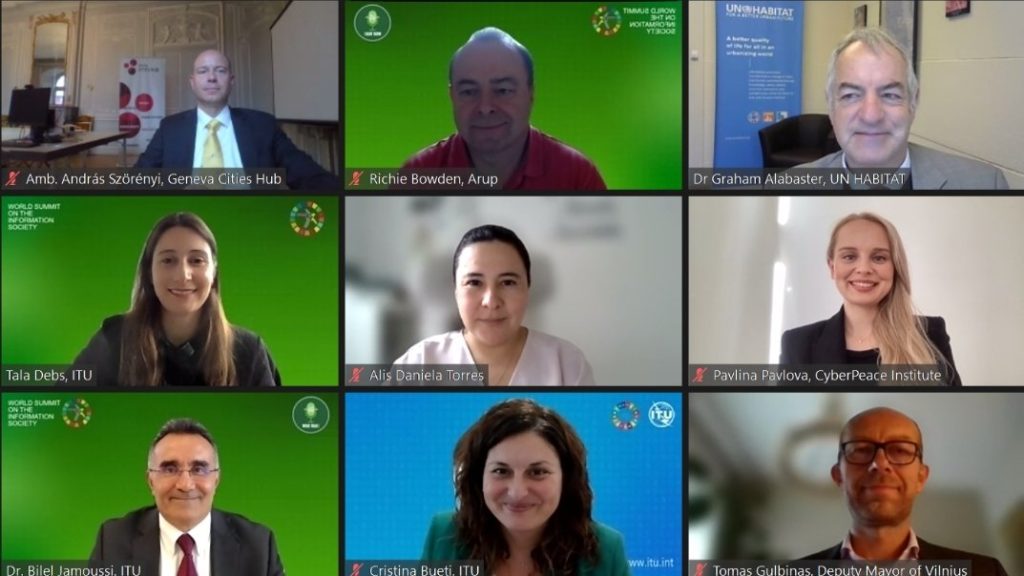- November 3, 2022
- 2775
To celebrate World Cities Day 2022 and as part of the WSIS&SDG TalkX series, Geneva Cities Hub in cooperation with ITU and UN-Habitat organized on 3 November 2022 a webinar dedicated to supporting cities to use digital transformation to improve adaptation actions to the looming climate and water challenge in urban settlements. Climate change is a global phenomenon with local effects in cities, especially extreme weather conditions, like heat waves and droughts on one hand, hurricanes and excessive rainfalls on the other. Urban areas are especially vulnerable to the growing risks of climate change. Speakers represented all relevant stakeholders: cities, city-networks, international organizations, the expert community and the business sector. They discussed how best to implement digital transformation in cities for effective climate adaptation, including effective water management systems, and they shared some specific examples in that regard.
Mayor Garcetti of Los Angeles, Deputy Mayor Kannan of Geneva and Deputy Mayor Gulbinas of Vilnius presented the efforts and achievements of their cities to build a sustainable and equitable future. The development in smart systems today makes our cities more resilient tomorrow. Digitalization is a policy issue that needs to include social change management. Mayors also shared concrete projects to strengthen climate change adaptation, including renewable energy, smart grids, innovative ways of using existing infrastructure, air quality mitigation, solar intensity data sharing, and sustainable urban mobility. Daniela Torres representing ICLEI Europe pointed out that our work on digital transformation today lays the foundations for the smart solutions of tomorrow towards a net-zero carbon future. Smart solutions need to take into account the connections among the digital, the physical and the financial aspects.
International organizations play a key role to assist cities on the way towards a sustainable and climate resilient future. Bilel Jamoussi and Cristina Bueti of ITU and Graham Alabaster of UN-Habitat offered a broad picture on the ongoing work at the international level. For example, the Internet of Things is enabling cities to collect climate data for better monitoring of the climate and response to hazardous situations. Artificial intelligence and quantum computing can help develop the best strategy to cope with these challenges. Digital technology can be a useful tool for better inform policy makers and can provide effective solutions to mitigate climate change and water-related challenges if widely available.
Pavlina Pavlova from the CyberPeace Institute reflected on the nexus between the security and human rights aspects of digitalization. When advancing urban digital transformation, cyber security and physical security need to go hand in hand. It is too often considered as a cost instead of being looked at as an investment to a resilient future.
Richard Bowden, Head of digitalization at ARUP shared concrete development project examples with the audience. Creating a sponge city is one of the concrete solutions to help cities cope with increasingly heavy rainfall and other impacts of climate change. Digital twins are powerful assets that cities can use to carry out high-precision simulations on climate adaptation and water scarcity.
The WSIS&SDG TalkX was a great platform to share experiences and inspirational stories about ICTs for development by stakeholders from all over the world. GCH was honored to collaborate with ITU WSIS and UN-Habitat because local action and city leadership are crucial to successfully achieve the New Urban Agenda, the 2015 Paris Agreement and the Sustainable Development Goals, in particular SDG11 which aspires to sustainable cities and communities by integrating urban challenges with climate, water, energy, and other environmental and socio-economic development aims.
All participants raised awareness on the significant role that digital transformation can play in enhancing climate and water adaptation actions and urban resilience. They highlighted different aspects of this complex issue. Their contributions advanced the global discussion, injected new inputs to the work of the Geneva-based international organizations and strengthened the message that urban digital transformation needs to follow a people-centered approach with an aim to increase the quality of life of the citizens while ensuring inclusiveness.

